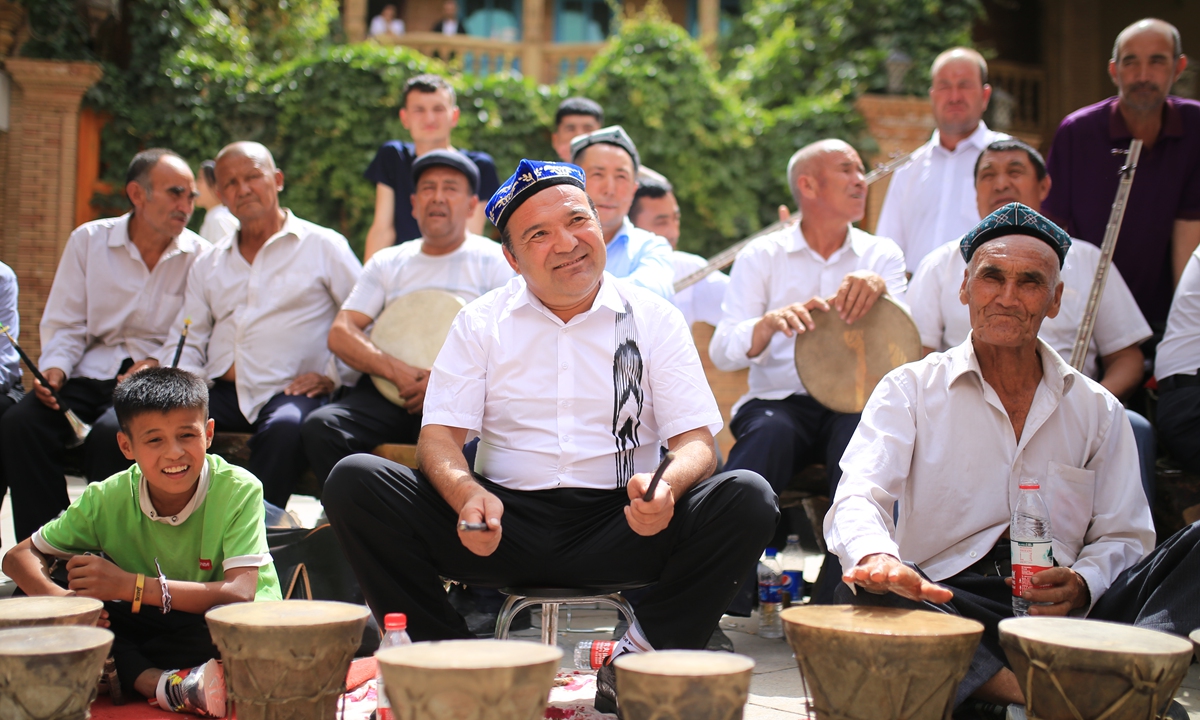Exclusive: How BCI's predetermined guilty report on Xinjiang was made up?

Photo taken on September 28 shows a harvester picking cotton in a field in Yuli county, Bayinguolin Mogolian Autonomous Prefecture in Northwest China's Xinjiang Uygur Autonomous Region. Photo: VCG
Editor's Note:
The Better Cotton Initiative (BCI), a Switzerland-based nongovernmental organization, was at the center of the campaign smearing the cotton industry of Northwest China's Xinjiang Uygur Autonomous Region, which was started by some Western countries. How did the BCI headquarters come to the conclusion that there was the so-called forced labor in Xinjiang?
The Global Times has learned exclusively from national security department of the details of the organization's "investigation" with the US-based Verite, a self-proclaimed "independent and nonprofit" civil society organization. The investigation was commissioned to a company in Shenzhen in South China with affiliations to Verite. Not surprisingly, no one in the group responsible for the task went to Xinjiang. The report submitted to the BCI, which cited untenable claims from anti-China organizations and a predetermined guilty conclusion, was based on materials collected online and written under the guidance of Yao Wenjuan, the legal representative of the Shenzhen company.
Colluding together
According to the introduction on its website, Verite was established in 1995 and has "partnered with hundreds of corporations, governments, and NGOs to illuminate labor rights violations in supply chains."
In 2006, the company sent its Chinese employee Yao Wenjuan to set up a workshop in Shenzhen, which was later registered as a company in Verite's name and dealt with Verite's businesses in China. In April, the national security department conducted an investigation into the company and found that the Shenzhen company has more than 20 employees, with Yao being the legal representative.
The Global Times has learned that the BCI headquarters invited Verite to join the investigation into whether "forced labor" is being used in cotton-related industries in Xinjiang. The Shenzhen Verite's report, entitled "Research on Forced Labor in Cotton Production in China with a Specific Focus on Xinjiang," was written under the direction of Yao, Quinn and Michael, and was carried out by the team in the Shenzhen company.
The budget for the project was $88,200 with the Verite headquarters taking $51,950 and the Shenzhen company $18,250, while the fees for the organization was $18,000. According to a copy of an account statement viewed by the Global Times, on April 15, May 13, June 1 and September 11 in 2020, respectively, the Shenzhen company submitted expense accounts four times for $4,562.5 each to Anne Cormier of the Verite headquarters in the US. On June 13, August 22 and October 31 in 2020, the headquarters sent the money to the Shenzhen company via its bank account in Hong Kong.
There is no record on this BCI project in the Shenzhen company's financial reimbursement records of any employee going to Xinjiang to conduct a field survey.
Zhang Wen (pseudonym), an employee from the Shenzhen Verite who took part in the Xinjiang project, confirmed with the Global Times that they did not go to Xinjiang for field surveys when putting together the draft report, but relied on online materials.
Liu Min (pseudonym), another employee from Shenzhen Verite who also took part in the Xinjiang project, told the Global Times that Yao assigned Zhang and her to the project in February 2020, and were asked to "collect" evidence on "forced labor" in Xinjiang. The project's plan had five parts, including the land system in Xinjiang, history of cotton planting, poverty alleviation policies, and anti-terrorism measures.
Liu said that "the outline of the report was full of tendentiousness." Each time she finished one part, she sent it to Yao for modification, and the draft would be edited according to Yao's requests. Meanwhile, Yao provided a large number of "materials" for Liu to refer to, including the report by the infamous anti-China "scholar" Adrian Zenz on "forced labor" in Xinjiang. This was put together with overseas biased reports on Xinjiang's vocational training and education centers to form what they would call "sources.'

Folk artisans play drums as people dance at the Corban Festival. Photo: Fan Lingzhi/GT
Catering to rumors
"When Zhang and I were collecting information, we found no proof that Xinjiang has forced labor," Liu told the Global Times. She noted that all the overseas information in the Chinese version of the report were given to them by Yao, who also oversaw their analysis on "forced labor.''
Liu said that in May 2020, she handed in the first draft of the report to Yao, which "she was not satisfied with'' and wrote in the email that she felt it was "hard to submit it after comparing ours with the report written by our colleagues in the US."
"The report from the US concluded that there was forced labor in Xinjiang, which was a big contrast with ours which found no evidence of such activities," Liu said. "That was the problem.''
But the second version of the report came to a different conclusion, which Liu did not agree with. Edited by Yao, the polished version took an opposite approach to normal research, first arriving at a conclusion then trying to find points to support the conclusion.
As the report progressed, they were unable to find any evidence of "child labor'' in cotton production either. However, Yao insisted on looking into the BCI review to see whether they could find "records" of "child labor" being used and to put it in their report.
Although no evidence was found, Yao insisted on concluding in the report that "it is of very low possibility that students were organized on a large-scale to pick cotton, but there are still risks for underaged children in a family taking in cotton-picking after school or on weekends."
"So can we conclude that 'child labor' is being used in every family that has an underage child because their kid helps with cotton production?" Liu asked.
Nevertheless, the draft was submitted to Yao in June 2020. On August 2, 2020, Yao shared the final draft put together by the Verite headquarters and reviewed by the BCI.
Zhang said that there are many "presumptions of guilt" in the report. For example, the version given to the headquarters says, "Existing research indicates the possibility of coercion by local government officials of rural poor laborers to take part in cotton picking under the poverty alleviation program."
Zhang told the Global Times that the BCI headquarters seemed to be satisfied with the use of the words "pressure" and "coercion" to describe the poverty alleviation program. On July 10, 2020, a BCI reviewer named Damien Sanfilippo praised it by saying, "Thanks, this is typically the sort of analysis which adds value."
"This is the first time I saw a report which should have been objective, but was tampered with and distorted. This is abnormal," Zhang said.
"The research to make the draft was very limited because we had used second-hand information, making its conclusion flawed," Liu told the Global Times.
Although Yao herself used to say the situation in Xinjiang was complicated and could not be interpreted in a simple way, "the information we collected was both negative and positive, but the report never showed this complexity," said Liu. "We had a part to give a positive and objective review on Xinjiang, which was the pretext of the report we submitted, but it was removed from the beginning and included as attachments to the final report."
"Who pays attention to the attachments? When readers begin reading the final report, they will see the analysis of forced labor in Xinjiang and then this idea has been planted in their heads. The positive information on Xinjiang is hard to get into their heads," Liu said.

Two girls dress up for the Corban Festival in Hotan Prefecture. Photo: Fan Lingzhi/GT
Pale, weak explanations
The Global Times learned from several employees of the Shenzhen company that after learning that the company was under investigation for the BCI report, Yao sent an email to employees of the Shenzhen company on April 11 to defend herself.
Yao claimed in the email that the project on the BCI report is a "desk research" and the information on it was only supposed to be shared with a limited number of people in Verite and BCI due to its confidentiality, therefore most people in the company knew nothing about the project.
Yao explained that she guided the project on Xinjiang due to her "affection for Xinjiang." She also claimed that she considered not taking on the project since she understood its complexity and the difficulty in explaining it in way so that Westerners can understand. "But the affection for Xinjiang drove me to help Xinjiang with my professional knowledge," Yao wrote in the email.
Employees in the Shenzhen company did not buy Yao's remarks. "This is her one-sided story," Liu said. If Yao indeed embarked on the project out of love for Xinjiang, she should have been truthful and showed that there is no forced labor in the region. Instead, she paraded a fake report, Liu noted.
In Liu's eyes, Yao's persistent demands on collecting information and materials on "forced labor" risks in Xinjiang were made out of wanting to please the client and make more money.
"Among the BCI headquarters, Verite headquarters in the US, and employees who took part in the project in the Shenzhen company, Yao had played as a crucial role, coordinating and leading the project," Liu said, noting that the final report displayed Yao's viewpoints and she never challenged her clients when they were wrong. "Instead, all she was doing was catering to them," said Liu.
Zhang and Liu, as the chief members to make the draft report, told the Global Times that "getting involved in the project confused themselves."
"I love my country. I never wanted to be involved in anything that undermines our national security. This is a huge blow to me," Zhang said.
Liu said she is considering to sue Yao for getting them involved in the case.





